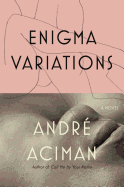
One of classical music's greatest mysteries is the secret theme that connects the 14 variations of Edward Elgar's "Enigma Variations." He claimed that, in this work, a "larger theme 'goes' but is not played." Love, one could argue, has something in common with Elgar's masterpiece: a fiber connects each person's attractions, but its nature may not be immediately evident. André Aciman no doubt had the same insight when he borrowed Elgar's title for a portrait of the various loves of Paul, a New York editor whose desires are more complicated than even he seems to realize.
The novel opens when Paul is a boy. He spends his summers on the island of San Giustiniano and falls in love with Giovanni, a cabinetmaker who restores an antique picture frame and two folding desks for Paul's parents. Later sections chronicle the adult Paul's relationships with his girlfriend Maud, who works for a firm that conducts cancer research and whom he suspects of cheating on him with a foreign correspondent; Manfred, a gay man he sees at his tennis club; Chloe, a college friend he bumps into at a book party and has an on-again, off-again romance with over many years; and Heidi, a young woman who wrote an essay that middle-aged Paul rejected about the mezzo-soprano Maria Malibran. The Heidi section feels tacked on, but Enigma Variations is otherwise an elegant, episodic tale of longing that manages the difficult trick of being both cerebral and sensuous. --Michael Magras, freelance book reviewer

